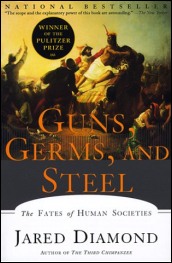Guns, Germs, and Steel by Jared M. Diamond
 Jared M. Diamond; there's a super-hero alter-ego name if ever I have heard one. By day, Jared lives the buttoned down life of a professor of geography, by night he becomes a maverick author. His secret power is being able to write worthy books on the development of human societies that become best sellers.
Jared M. Diamond; there's a super-hero alter-ego name if ever I have heard one. By day, Jared lives the buttoned down life of a professor of geography, by night he becomes a maverick author. His secret power is being able to write worthy books on the development of human societies that become best sellers.
Guns, Germs, and Steel is an attempt to explain why the different human societies have ended up in the places they inhabit today, by looking at the different environments that various societies lived in as humans migrated around the planet in pre-history. Diamond has spent much of his life in Papua New Guinea, and the book often makes the comparison between the technology and lifestyles of native New Guinean population and the foreigners living there. Guns, Germs, and Steel argues that these differences are not due to any inherit inferiority in the natives, but that the European society had developed in a natural environment that fostered the easy development of technological advancement.
For instance, Europe has a large land-mass in a roughly east-west orientation. As plants and animals were domesticated, they could easily spread from one end of Europe to the other since the climate is similar at similar latitudes. Europe also had the advantage of having many species of wild plants suitable for easy domestication. Although the Americas also have a large land mass, the north-south orientation of the continent meant that a plant domesticated in the north could not be spread widely. Europe's more numerous food sources led to surpluses, which lead to higher populations, which led to new systems of government, which led to more man-power available, which led to inventions that eventually led to European powers conquering the Americas.
All of this is quite straight forward to anyone who has played a few games of Civilization, but Diamond backs it all up with tables listing wild grains and animals suitable for human domestication, figures of population growth and tool use, and many anecdotes from history. I found Diamond's arguments very plausible, and he takes pains to preempt some of the more obvious criticisms of his ideas.
Guns, Germs, and Steel is a very entertaining read - highly recommended.